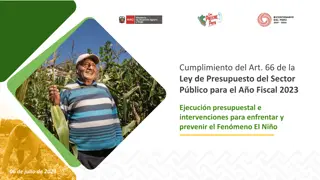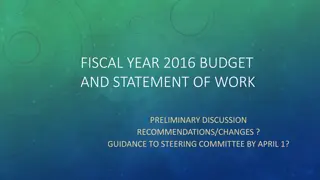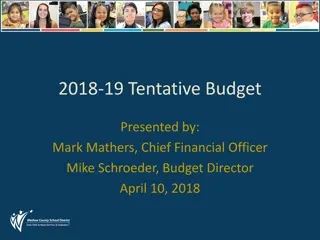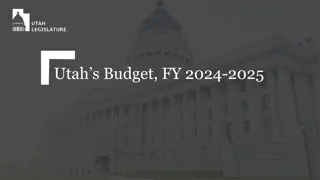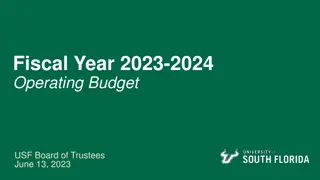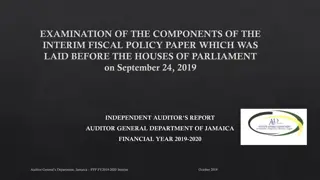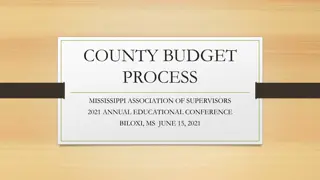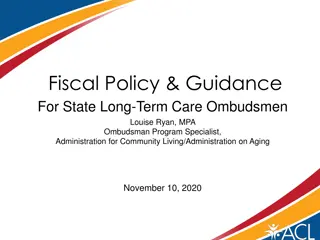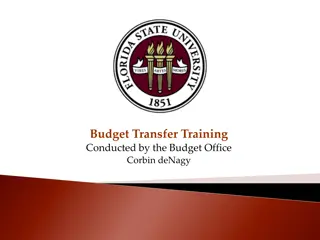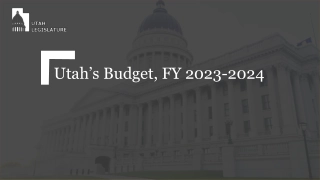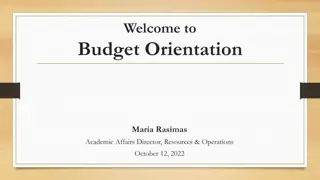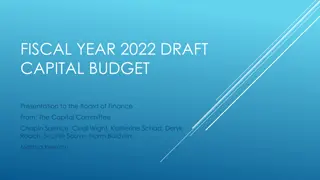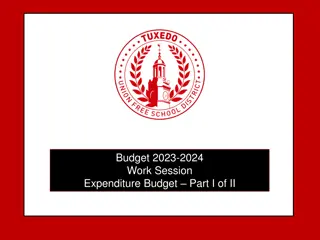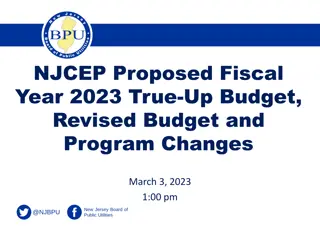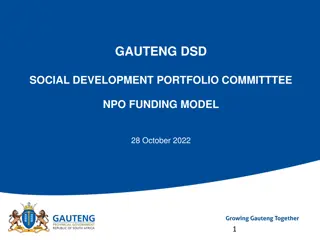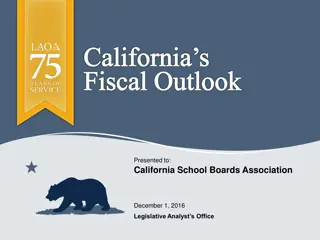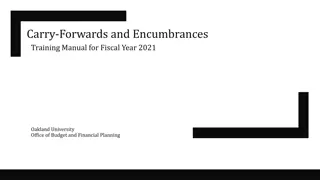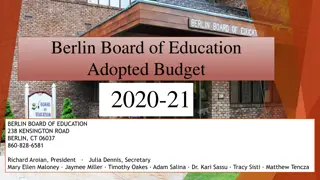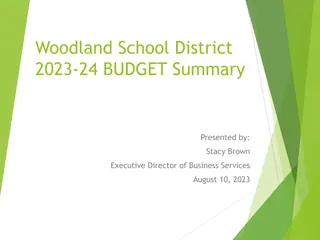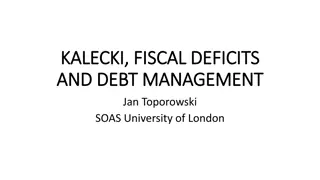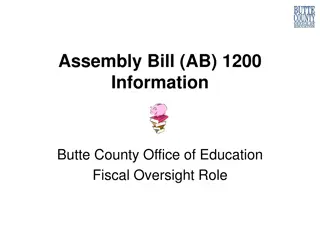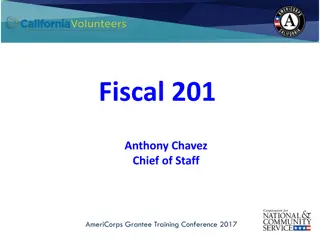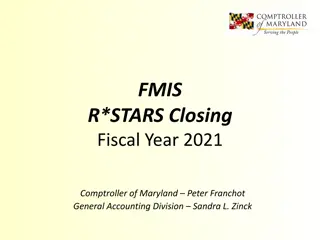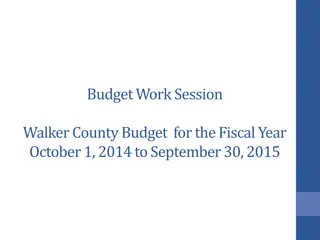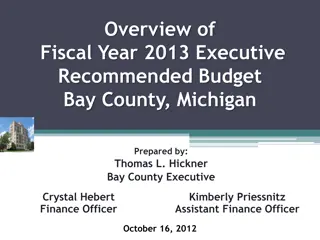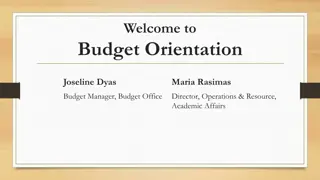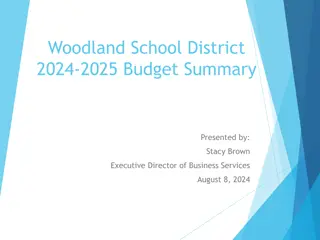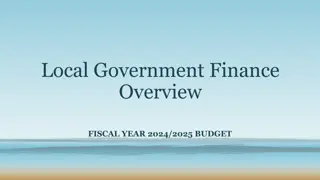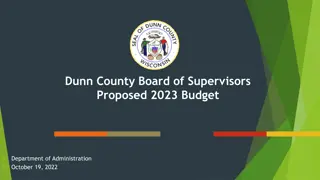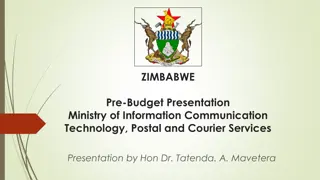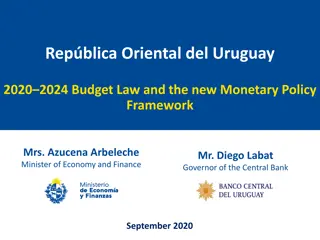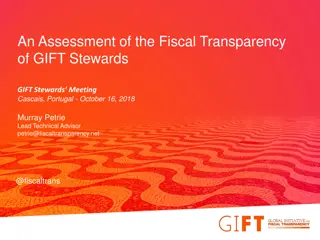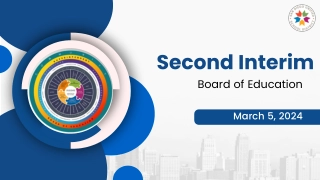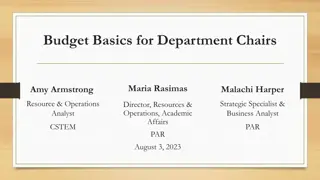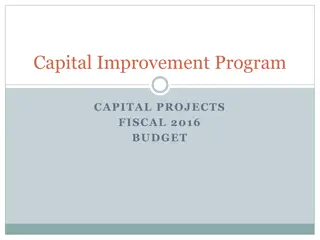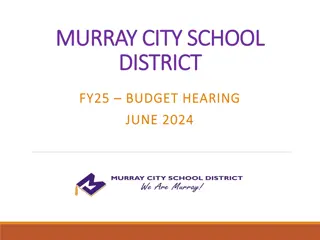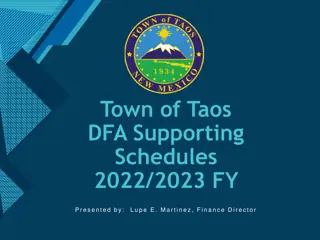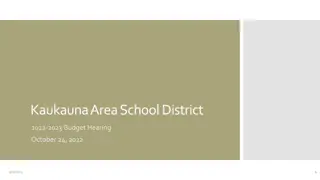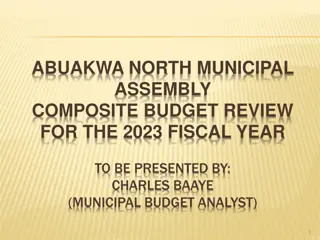Fiscal Year 2023 Budget Summary Presentation
Driven by Employee Pride, this presentation outlines the budget summary for fiscal year 2023 as presented by Harold Ward, Cabinet Secretary. It emphasizes the importance of restoring and protecting the environment in West Virginia, in alignment with the state's laws and regulations. The vision is to achieve a fully-protected and healthy environment where every West Virginian can thrive. The mission is to enforce environmental laws efficiently to maintain a healthful environment while supporting economic sectors. Core values include professionalism, integrity, education, knowledge, expertise, credibility, and public service. The Department of Environmental Protection (DEP) is organized with Harold Ward as Cabinet Secretary and Scott Mandirola as Deputy Cabinet Secretary. Activities of DEP involve air quality, water quality, waste management, oil & gas, mining, permitting, inspection, enforcement, remediation, voluntary compliance, and education & outreach.
Download Presentation

Please find below an Image/Link to download the presentation.
The content on the website is provided AS IS for your information and personal use only. It may not be sold, licensed, or shared on other websites without obtaining consent from the author. Download presentation by click this link. If you encounter any issues during the download, it is possible that the publisher has removed the file from their server.
E N D
Presentation Transcript
BUDGET SUMMARY PRESENTATION FISCAL YEAR 2023 Driven by Employee Pride Harold Ward, Cabinet Secretary
PURPOSE W. Va. Code 22-1-1 (a)(1) Restoring and Protecting the environment is fundamental to the health and welfare of individual citizens, and our government has a duty to provide and maintain a healthful environment for our citizens. W. Va. Code 22-1-1 (b)(4) - to improve the quality of the environment consistent with the benefits to be derived from strong agricultural, manufacturing, tourism and energy-producing industries
VISION A fully-protected and healthy environment where every West Virginian can live, work, prosper and enjoy a high quality of life.
MISSION To efficiently and effectively carry out the State's environmental laws and regulations that are designed to provide and maintain a healthful environment consistent with the economic benefits derived from strong agricultural, manufacturing, tourism and energy- producing industries.
CORE VALUES Professionalism Integrity Education Knowledge Expertise Credibility Public Service
DEP ORGANIZATION Harold Ward, Cabinet Secretary Scott Mandirola, Deputy Cabinet Secretary
ACTIVITIES Air Quality, Water Quality, Waste Management, Oil & Gas, and Mining Permitting Inspection Enforcement Remediation Voluntary Compliance Education & Outreach
Division Division of Air of Air Qua Quality lity The Division of Air Quality (DAQ) protects the State s air quality as follows 1. Monitor, collect, analyze and summarize air quality data collected 2. Inspect and investigate air pollution sources 3. Address citizen complaints involving alleged air pollution violations 4. Inspect asbestos demolition and renovation projects 5. Process permit applications for major air emission facilities (Federal Clean Air Act) 6. Process source pre-construction permit applications for industry to build or expand operations 7. Develop and revise state implementation plans for National Ambient Air Quality Standards (enabling West Virginia to maintain federal funding) 8. Provide free confidential air quality assistance to small businesses (Small Business Assistance Program)
Division Division of of Land Restoration Land Restoration The Division of Land Restoration (DLR) restores the State s environment by reclaiming former coal mining and industrial sites. The two offices of the Division of Land Restoration are Environmental Remediation and Environmental Reclamation. Environmental cleanup includes 1. Remediation a. EPA s Superfund b. Brownfields c. Voluntary Remediation 2. Reclamation a. Abandoned Mine Lands and Reclamation (AMLR) - restores and reclaims West Virginia s land and water resources disturbed by surface mining operations prior to the passage of the federal Surface Mine Control and Reclamation Act of 1977. This office is funded 100% by federal dollars and conducts millions of dollars in reclamation work each year. b. Special Reclamation (SR) Rehabilitation of lands which were subjected to permitted surface mining operations and abandoned after August 3, 1977. c. Landfill Closure and Assistance Program (LCAP) Remediation of non-compliant and closed landfills as of December 31, 1994 to acceptable environmental standards.
Division Division of of Mining and Reclamation Mining and Reclamation The Division of Mining and Reclamation (DMR) regulates the surface effects of all coal and non-coal mining activity under the West Virginia Surface Coal Mining and Reclamation Act and other applicable state laws and rules. One of the critical goals of the DMR is to ensure that the State s program conforms to the federal Surface Mining Control and Reclamation Act, with oversight from the federal OSM. This is accomplished through 1. Permitting 2. Inspection 3. Enforcement
Division of Water and Waste Management Division of Water and Waste Management The Division of Water and Waste Management s (DWWM) mission is to preserve, protect, and enhance the state s watersheds for the benefit and safety of all citizens. Regulated activities and efforts include the following: 1. Hazardous waste 2. Solid waste 3. Surface and groundwater pollution 4. Industrial, municipal and storm water discharges 5. Construction, operation, and closure of hazardous and solid waste facilities 6. Underground and above ground storage tank programs 7. Education, technical, and financial assistance 8. Comprehensive watershed assessments 9. Groundwater monitoring 10.Water quality standards implementation 11.Wetlands preservation 12.Permitting 13.Inspection 14.Enforcement The Clean Water State Revolving Fund program is a funding program to address water quality problems through wastewater facility construction, upgrades, or expansions. The program is charged with general oversight, fiscal management, and administrative compliance review of local governmental entities that receive funds. To date, the program has granted more than $1 billion in loans to assist with construction and upgrades to these facilities.
Office of Oil and Gas Office of Oil and Gas The Office of Oil and Gas protects the public health, environment, and other natural resources through the regulation of oil and gas resource development and the plugging and reclamation of abandoned oil and gas well sites. 1. Permitting 2. Inspection 3. Enforcement 4. Abandoned Well Plugging
Executive Executive The Executive Office includes the following units. 1. Administrative Support Offices a. Business Operations b.Integrated Regulatory Information Support (IRIS, which is the IT function for the DEP) - Expansion of E-permitting a top priority c. Human Resources Division 2. Homeland Security and Emergency Response for hazardous waste emergencies (HSER) 3. Environmental Advocate s Office--the public s main access to the DEP a. Youth Environmental Program b.Pollution Prevention and Open Dump c. Public participation in cleaning up roadside litter, streams, and open dumps d.Provide grants for general recycling, litter control, and electronic recycling. 4. Public Information Office (PIO) 5. Office of Legal Services (OLS)
DEPARTMENT OF ENVIRONMENTAL PROTECTION FINANCES Money Management and Fiscal Responsibility The DEP is careful to expend only necessary funds to execute its regulatory programs. The agency s goal is to be more efficient and effective through its I.T. infrastructure and other means to meet the needs of a complex regulatory environment.
INVESTMENT STRATEGY, ASSURING FUNDING FOR LONG-TERM LIABILITIES The agency takes very seriously its responsibility to ensure that unfunded environmental liabilities do not fall to future generations of West Virginians. The DEP is careful to build cash within its Special Revenue accounts to support ongoing environmental liabilities and provide funds for periods when industry activity and associated fees lag. Investment Income Amount 3,243,689.95 3,259,426.37 17,745,357.15 11,093,355.46 19,411,519.99 16,797,869.32 47,974,318.99 -630,249.66 2022 to date FY 2015 2016 2017 2018 2019 2020 2021 The Special Reclamation Funds, for instance, support reclamation of mining sites whose bonds were forfeited. The DEP has implemented investment strategies for these funds to ensure it maximizes returns without undue risk to the principle, increasing the availability of funds to meet these long-term liabilities. Certainly, the past five fiscal years has seen phenomenal earnings in market securities. However, market adjustments are inevitable. This has never been more true than this agency s activity in investments for fiscal year 2022 to date. The investments for DEP are managed by the West Virginia State Treasurer and the portfolio for our investments are considered a moderate risk.
FEES The DEP collects various fees from the industries it regulates to support its programs. Traditionally, fees are based on estimated costs to run regulatory program(s) supported by the fee. The Oil and Gas Operating and Permits Fund is supported by one time permit fees ($10,000/$5,000 for a horizontal well.) Currently this fee must support the regulatory oversight of these wells into perpetuity. Likewise, in the mining industry, there are federally mandated inspection frequencies. Even idle or reclaimed mines must be inspected to protect from environmental hazards. With fee collections lower, the DEP must continue to carry out inspection activities.
DEP CHALLENGES - OOG The West Virginia Department of Environmental Protection s Office of Oil and Gas (OOG) provides the regulatory and reclamation oversight for the state s prospective, active, and abandoned oil and natural gas wells. OOG s operations are predominately funded through special revenue, largely a one-time permit application fee for well work. Decreases in industry permitting activity in FY 2019 and more dramatically in FY 2020, led to revenue shortfalls of approximately $250K and $800K respectively in those fiscal years. Consequently, while OOG undertook other measures to reduce expenditures and explore additional funding, we were faced with the need to decrease staff. The staff reduction process led to a departure of 14 OOG staff members and the reallocation of funding for a position to another division in DEP. Fortunately, due to continued expenditure decreases and a slight revenue increase, revenues exceeded expenditures in FY 2021 by approximately $150K. It is recognized that this lower staffing level is not ideal for ensuring a desired level of performance. Consequently, OOG will be seeking a reliable and sustainable funding source for staff hiring to assist in serving our customers and meeting mandates for protecting the environment. OOG will be working with all stakeholders to develop a plan to obtain the funding necessary to maintain a viable and solvent oil and gas environmental regulatory program.
DEP CHALLENGES - DMR The average coal tonnage fees (2 cents per clean ton mined) deposited into DMR s Operations Fund for the past two years was approximately $1,398,935, a 25.6% decrease from fiscal year 2019. The amount of coal mined in tons is forecast to increase slightly in the next two years to approximately 80 million tons annually, then gradually decline to 73 million tons by 2025. Other coal mining related funds are experiencing similar decreases. Those funds consist of Fund 3301 Operator Permit Fees (WV SMCRA permit fees) and Fund 3490 Mountain Top Removal Fund (Explosive Material Fees). MINE STATUS STATUTORY INSPECTION FREQUENCY Every 30 days Quarterly Annually Active Inactive Abandoned
DMR: The agency is directed by WV Code and applicable federal laws to regulate the environmental effects of the mining industry through continued inspection and enforcement activities. West Virginia receives a federal grant through the Department of the Interior for these regulatory purposes, which requires a 50/50 state match. Although the program size has been adjusted in relation to market and regulatory conditions, future funding issues are expected to continue as revenues are anticipated to decline. Cash Balance (All DMR Funds) $12,000,000 $10,868,066 $10,002,231 $9,395,628 $10,000,000 $9,655,653 $8,000,000 $6,005,453 $6,000,000 $3,291,853 $4,000,000 $444,653 $2,000,000 $0 FY2019 FY2020 FY2021 FY2022 FY2023 FY2024 FY2025 Ending Cash Balance
BUDGET The budget of the DEP is predominantly Federal and Special Revenue, with approximately 1.19% ($6.5 Million) of funds appropriated from General Revenue. Total budgets: FY2021 $546,338,596 FY2022 $544,593,642 FY2023 $548,957,225* Improvements Improvements No improvements have been granted in the past two fiscal years for the agency.
Budget By Funding Source 350,000,000 300,000,000 250,000,000 200,000,000 150,000,000 100,000,000 50,000,000 0 General Fund Federal Fund Special Revenue 343,331,299 341,586,345 344,995,139 FY 2021 FY 2022 FY 2023 6,498,479 6,401,002 6,586,199 196,508,818 196,508,818 197,375,887 FY 2023 Budget Includes 5% increase in Personal Services pending passage in the 2022 Legislative Session
EXPENDITURES The Chart below shows the DEP s expenditures from 2017 to date. Increases in expenditures have occurred as the Legislature has added new programs to DEP s responsibilities, including the Aboveground Storage Tank Act in 2014. The DEP also spends more when federal grants are higher. As noted below, awarding grants and performing reclamation remain the bulk of expenditures of the DEP. These activities inject over $100 million into the economy of West Virginia each year, with much of it being federal dollars. With the exemption of the DEP s construction and reclamation contracts from review of the State Purchasing Division, reclamation activity has become more efficient, resulting in the issuance of more reclamation contracts this fiscal year, especially in the Special Reclamation and Abandoned Mine Lands Programs. Actual Expenditures 180,000,000 160,000,000 140,000,000 120,000,000 100,000,000 80,000,000 60,000,000 40,000,000 PERSONAL SERVICES & BENEFITS OPERATING GRANTS & RECLAMATION Personal Services & Benefits 54,151,008 52,216,187 51,967,677 55,656,829 55,596,845 Operating 71,779,974 66,607,242 62,553,875 55,595,586 45,201,052 Grants & Reclamation 156,518,424 127,474,321 121,949,578 169,468,093 131,457,531 FY 2017 FY 2018 FY 2019 FY 2020 FY 2021
EMPLOYMENT The agency strives to staff the organization to the needs of its regulatory requirements. As the needs of the regulated community fluctuate, the agency is constantly adjusting. Filled FTEs have been relatively static, even as the DEP has expanded some programs to meet additional regulatory requirements.
BOARDS AND COMMISSIONS BUDGETS FY 2023 Budget Includes 5% increase in Personal Services pending passage in the 2022 Legislative Session


